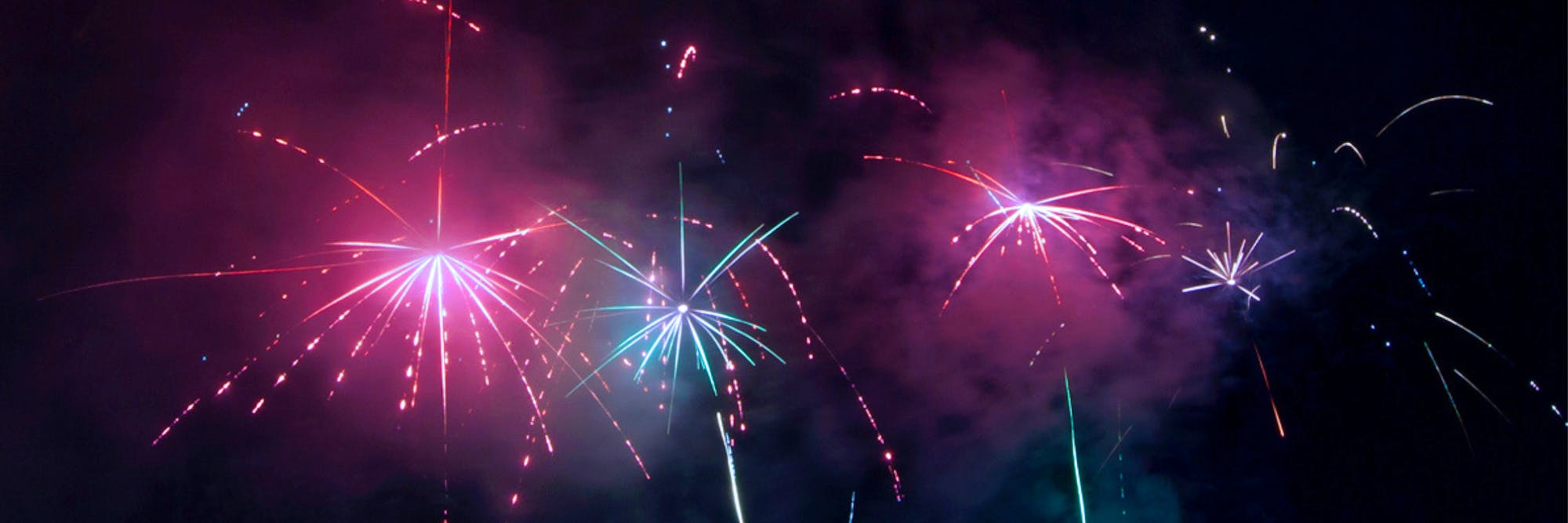This blog was written by Defenders of Wildlife Communications Intern, Hannah Schwartzberg
Growing up, I was mesmerized by fireworks. The brilliant bursts of color lighting up the night sky, the powerful booms echoing in the air and the shared excitement of the crowd watching in wonder. While these explosive light displays are a marvel and may seem harmless, they can wreak havoc on local wildlife by startling animals and polluting our water and air.
The good news? Celebrating doesn’t have to come at nature’s expense. There are plenty of fun and safe ways to keep the festive spirit alive while being kinder to our planet and its inhabitants. Here are four eco-friendly options to consider:
1. Explore Firework Alternatives
The noises produced from firework displays are very disorienting to many species. Startled birds often flee their nests in panic, sometimes abandoning their eggs or chicks for good. Flocks have been found dead after colliding with buildings or suffering from shock. Deer, foxes and other wildlife on the ground may bolt into traffic or fences in their frantic attempt to escape the noise, often resulting in injury or even death.
Luckily, there's a growing movement toward less disruptive ways to enjoy light shows. In Boulder, Colorado, city officials replaced their Fourth of July fireworks with an innovative drone display that lit up the sky without causing panic among local wildlife. Sydney, Australia has also experimented with replacing parts of its famous New Year’s Eve celebration with projections and low-noise pyrotechnics. Most notably, the 2024 Paris Olympics Opening Ceremony utilized lasers to create a stunning show for viewers, without the noise pollution fireworks typically cause.
2. Responsible Trash Disposal
After a long day of celebration, what gets left behind? Trash, and while it may seem harmless, even a few pieces can pose a serious threat to wildlife.
Firework debris, like spent shells and leftover metals, can contaminate waterways, threatening fish and amphibians in the aftermath of the celebration. Fireworks are not recyclable and must be handled with special care. If you decide to take part in a smaller firework celebration, make sure to check with your local waste management facility for proper disposal guidelines.
Beyond the trash from the fireworks themselves, litter from celebrations such as food waste, empty cans and even fishing hooks, can easily be ingested by animals or disrupt their habitats.
Properly disposing of waste throughout and after a gathering is vital to protecting wildlife. Some communities host cleanup events the day after large gatherings, but if your area doesn’t, consider rallying a few friends and organizing your own. Even small efforts make a huge difference when it comes to ensuring our celebrations don’t come at the cost of the natural world.
3. Protect your Pets
My dog is terrified of fireworks. Anytime they go off, he finds the nearest hiding spot, whimpering and trembling. Countless pets experience this same overwhelming fear, often with dangerous consequences.
Pets, particularly dogs and cats, are far more sensitive to loud noises than we are, and sudden, unfamiliar sounds like fireworks can trigger severe anxiety. This distress can even cause pets to flee from their homes in an effort to escape the noise. A pet on the loose is not only a danger to themselves, but also to local wildlife who may think it is being hunted or feel threatened.
Creating a safe space for your pet, whether it’s a cozy room with their favorite blanket or turning on calming music to muffle the outside noise, can make a big difference. Staying close by to reassure them can also go a long way in helping them feel secure. In the long-term, you can gradually introduce them to loud sounds in a controlled environment. This will help acclimate and reduce their fear during such events.
Finally, it’s essential to ensure your pet has proper identification, including a microchip and an ID collar with up-to-date contact information in case they escape.
4. Choose Safe Locations to Celebrate
It’s important to be thoughtful about the location when planning a celebration, especially when fireworks are involved. Setting off fireworks near wildlife habitats, waterways, or dry grassy areas can have serious consequences. Fireworks can easily spark wildfires, which puts people and animals at risk.
If fireworks are a must-have part of the celebration, consider attending a public display instead of setting off your own. Professionally managed events are typically held in safer locations, with precautions in place to prevent damage to nearby wildlife and land.
We often get caught up in tradition and the joy of shared moments. But what if we could keep that joy and leave behind the unintended harm? The effect of fireworks on the environment and wildlife cannot be ignored. Choosing safe-for-wildlife alternatives, cleaning up after ourselves, caring for our pets and picking responsible locations can help make sure our good times don’t come at our animal friends’ expense.








